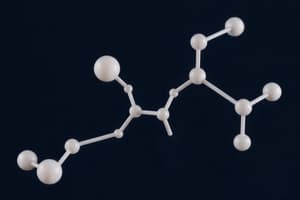Podcast
Questions and Answers
What are carbohydrates?
What are carbohydrates?
Organic biomolecules abundantly distributed in animals and plants.
Monosaccharides are carbohydrates which cannot be hydrolyzed into more simple ______.
Monosaccharides are carbohydrates which cannot be hydrolyzed into more simple ______.
sugars
Which of the following lists the classifications of carbohydrates?
Which of the following lists the classifications of carbohydrates?
- Monosaccharides, Disaccharides
- Oligosaccharides, Polysaccharides
- All of the above (correct)
- None of the above
All polysaccharides yield similar monosaccharide units upon hydrolysis.
All polysaccharides yield similar monosaccharide units upon hydrolysis.
What is the general formula for a monosaccharide?
What is the general formula for a monosaccharide?
What type of carbohydrate yields two monosaccharide molecules upon hydrolysis?
What type of carbohydrate yields two monosaccharide molecules upon hydrolysis?
What are the two types of polysaccharides based on the nature of hydrolytic products?
What are the two types of polysaccharides based on the nature of hydrolytic products?
The word ‘saccharide’ is derived from the Greek word ______, which means ‘sugar’ or ‘sweet.’
The word ‘saccharide’ is derived from the Greek word ______, which means ‘sugar’ or ‘sweet.’
Flashcards
Monosaccharides
Monosaccharides
Carbohydrates that cannot be broken down into simpler sugars through hydrolysis.
Carbohydrates
Carbohydrates
Organic molecules found in plants and animals.
Disaccharides
Disaccharides
Carbohydrates that yield two monosaccharides upon hydrolysis.
General Monosaccharide Formula
General Monosaccharide Formula
Signup and view all the flashcards
Polysaccharide Hydrolysis
Polysaccharide Hydrolysis
Signup and view all the flashcards
Homopolysaccharides
Homopolysaccharides
Signup and view all the flashcards
Heteropolysaccharides
Heteropolysaccharides
Signup and view all the flashcards
Meaning of 'Saccharide'
Meaning of 'Saccharide'
Signup and view all the flashcards
Study Notes
Definition
- Carbohydrates are organic compounds made up of polyhydroxy aldehydes or ketones.
- They are also described as compounds that yield polyhydroxy aldehydes and ketones upon hydrolysis.
Classification
- Monosaccharides are simple sugars that cannot be hydrolyzed into simpler sugars.
- Disaccharides are carbohydrates that yield two molecules of similar or dissimilar monosaccharides upon hydrolysis.
- Oligosaccharides yield three to ten monosaccharides units upon hydrolysis.
- Polysaccharides yield more than ten monosaccharide units upon hydrolysis. They are also known as glycans.
Characteristics of Monosaccharides
- Monosaccharides have a molecular formula of CnH2nOn, where 'n' represents the number of carbon atoms.
- Monosaccharides containing an aldehyde group (-CHO) are called aldoses.
- Monosaccharides containing a ketone group (-CO) are called ketoses.
Biologically Important Carbohydrates
- Plants synthesize carbohydrates through photosynthesis, storing energy in the form of glucose.
- In animals, excess glucose is converted into glycogen for long-term energy storage.
- Specific carbohydrates like ribose, lactose, and galactose are structural components of nucleic acids, lipids, and breast milk.
Classification of Mucopolysaccharides
- Homopolysaccharides yield similar monosaccharide units upon hydrolysis. Examples include starch, glycogen, inulin, and cellulose.
- Heteropolysaccharides yield dissimilar monosaccharide units upon hydrolysis. Examples include hyaluronic acid, heparin, chondroitin sulfate, and keratan sulfate.
Studying That Suits You
Use AI to generate personalized quizzes and flashcards to suit your learning preferences.
Related Documents
Description
Explore the world of carbohydrates in this quiz. Learn about the different classifications such as monosaccharides, disaccharides, oligosaccharides, and polysaccharides, including their characteristics and biological significance. Test your knowledge on how these organic compounds are structured and function in living organisms.



